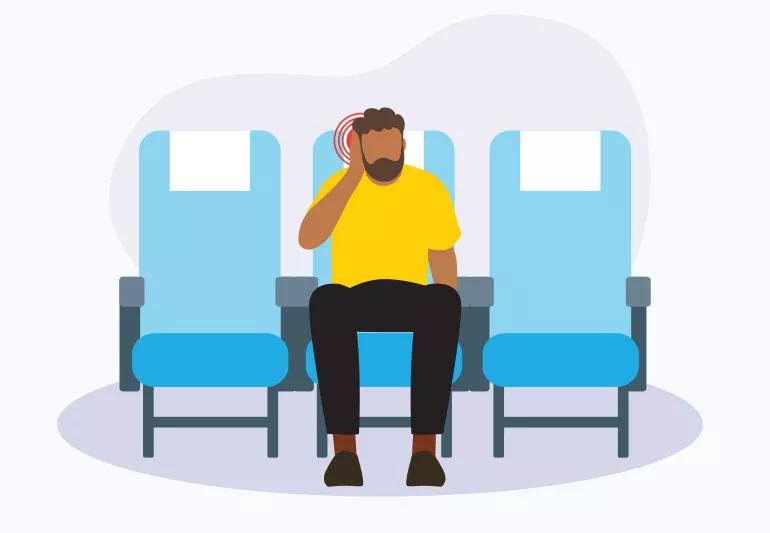There are a few safe ways to relieve this uncomfortable pressure

Image content: This image is available to view online.
View image online (https://assets.clevelandclinic.org/transform/ba0dcfe5-84c6-4829-a6f4-7d547ae11101/how-2-pop-ears-1250291453-770x553-1_jpg)
Man sitting in airplane seat experiencing ear pressure pain.
It’s one of the worst parts of flying: You finally hit that cruising altitude, and suddenly, you have ear congestion — that feeling that your ears are somehow plugged up.
Advertisement
Cleveland Clinic is a non-profit academic medical center. Advertising on our site helps support our mission. We do not endorse non-Cleveland Clinic products or services. Policy
Plugged-up ears are so common when traveling by airplane that there’s actually a special name for it: airplane ear. However, flying isn’t the only reason why your hearing might become muffled and you suddenly need to pop an ear.
Family medicine specialist Matthew Goldman, MD, explains how to unclog your ears, what causes them to feel plugged up in the first place and how to safely pop your ears if you feel the need to relieve the pressure.
Having plugged-up ears is an annoying problem at best and a frustrating, painful one at worst. Sometimes, a clogged ear will go away by itself, but Dr. Goldman shares a few ways you can try to relieve the pressure and get your ears to pop.
Between the area behind your eardrum and the back of your nose and throat is a tube called the Eustachian tube. You’ve got two of them — one behind each ear. “This tube helps to maintain balanced air pressure between the area behind the eardrum and the area outside of the eardrum,” Dr. Goldman explains.
If you’ve ever had clogged ears, there are two methods you can try to unclog them. The pressure these two maneuvers create can help open your Eustachian tubes. Research shows that these two methods have about the same success rate at unplugging, or “popping,” your ears.
Advertisement
Close your mouth and pinch your nostrils closed. Then, breathe out forcefully — but don’t let any air escape through your mouth or nose.
Close your mouth, pinch your nostrils closed and swallow.
Your Eustachian tubes are typically closed, opening when you perform activities like swallowing and yawning. So intentionally doing these things may help unclog your ears, especially if there’s no underlying cause like allergies or an infection.
“There are different ways to equalize the pressure that creates the plugged-up sensation,” Dr. Goldman says, including chewing gum, swallowing and yawning.
Using a nasal spray can relieve sinus blockage and inflammation, which can ultimately help unplug your ears. Just be sure you’re using the nasal spray correctly by aiming it toward the back of your nose rather than toward your septum (the middle of your nose).
Have you ever known someone who gets recurrent ear infections and has to have ear tubes put in? This is one of a few ways doctors can address chronic Eustachian tube dysfunction, which is common in children.
Dr. Goldman says plugged ears can be uncomfortable and occur for a few reasons, including:
“Most of the time, these are all safe and effective methods,” Dr. Goldman says, “but depending on the cause, these methods could be unsafe and could even cause damage.”
If you’re traveling in high altitude changes or know you’re in the midst of an allergic flare-up, your clogged ears likely aren’t a problem and should resolve pretty quickly. But clogged ears that persist or are accompanied by other symptoms can indicate a more serious issue. Pay attention to issues like:
In these cases, it’s time to see your doctor, who’ll be able to determine the root cause of your issues and figure out a treatment plan.
If you’re experiencing something like swimmer’s ear or allergies, you can best treat your plugged-up ears by treating the medical condition that’s causing them.
“Depending on the cause, antihistamines, decongestants, nasal sprays and occasionally surgery may be needed to help manage and/or treat the root of the problem and/or mask the symptoms until the cause has resolved,” Dr. Goldman says.
Advertisement

Sign up for our Health Essentials emails for expert guidance on nutrition, fitness, sleep, skin care and more.
Learn more about our editorial process.
Advertisement
Noise-induced hearing loss is 100% preventable
Understand the symptoms and find relief
Most recommended precautions center around minimizing bruising or swelling
Even one drink can have an impact on your cognitive function leading to slurred speech, blurred vision and impaired memory
Understand who may (and may not) benefit
Lorem ipsum dolor sit amet. Et odio Quis vel ipsam omnis eum alias deleniti et placeat impedit non voluptas galisum hic autem enim et cupiditate aliquid. Est beatae quidem non facilis autem ut commodi nisi aut tempore rerum et dolores voluptatem cum enim optio id sapiente quasi. Ad laboriosam officiis 33 cupiditate sequi ea voluptatum consectetur qui necessitatibus voluptate et quasi doloremque et facere explicabo quo explicabo officia
Type 2 diabetes isn’t inevitable with these dietary changes
Applying a hot or cold compress can help with pain
Pump up your iron intake with foods like tuna, tofu and turkey